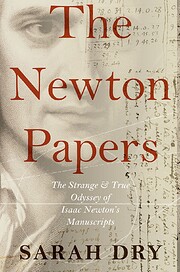

Pulse en una miniatura para ir a Google Books.
|
Cargando... The Newton Papers: The Strange and True Odyssey of Isaac Newton's Manuscriptspor Sarah Dry
 Ninguno Actualmente no hay Conversaciones sobre este libro.   ) )sin reseñas | añadir una reseña
"When Isaac Newton died at 85 without a will on March 20, 1727, he left a mass of disorganized papers--upwards of 8 million words--that presented an immediate challenge to his heirs. Most of these writings, on subjects ranging from secret alchemical formulas to impassioned rejections of the Holy Trinity to notes and calculations on his core discoveries in calculus, universal gravitation, and optics, were summarily dismissed by his heirs as "not fit to be printed." Rabidly heretical, alchemically obsessed, and possibly even mad, the Newton presented in these papers threatened to undermine not just his personal reputation but the status of science itself. As a result, the private papers of the world's greatest scientist remained hidden to all but a select few for over two hundred years. In The Newton Papers, Sarah Dry divulges the story of how this secret archive finally came to light--and the complex and contradictory man it revealed. Covering a broad swath of history, Dry explores who controlled Newton's legacy, who helped uncover him, and what, finally, we know about him today, nearly three hundred years after his death. The Newton Papers presents the eclectic group of collectors, scholars, and scientists who were motivated to track down and collect Newton's private thoughts and obsessions, many of whom led extraordinary lives themselves--from economist John Maynard Keynes to Abraham Yahuda, a friend of Albert Einstein and key figure in the founding of Israel. The 300-year history of the disappearance, dispersal and eventual rediscovery of Newton's papers exposes how Newton has been made, and re-made, at the hands of unique and idiosyncratic individuals, reflecting the changing status of science over the centuries"-- No se han encontrado descripciones de biblioteca. |
Debates activosNinguno
 Google Books — Cargando... Google Books — Cargando...GénerosSistema Decimal Melvil (DDC)530.092Natural sciences and mathematics Physics Physics Physics Biography And History BiographyClasificación de la Biblioteca del CongresoValoraciónPromedio: (3.75) (3.75)
¿Eres tú?Conviértete en un Autor de LibraryThing. |
||||||||||||||||||||||||||||||||||||||||||||||||||||||||||||||||||||||||||||||||||||||||||||||||||||||||||||||||||||||||